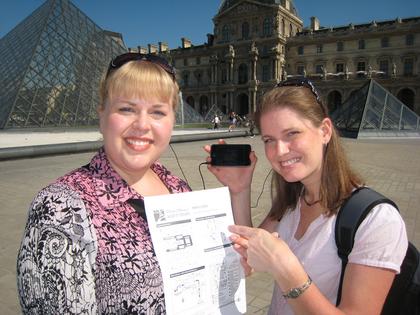Navigating Europe in the Digital Age
Published in Rick Steves' Europe
Several years ago, I was invited to Amazon.com headquarters. After signing a legal promise of secrecy, I was taken into a special room. Someone came in carrying a package containing Amazon's secret weapon ... the Kindle.
It was turned on. And from the second I held it, so was I. It felt like I was holding the future. Since then, the ebook market has taken off. The Kindle has worthy competitors, including the iPad, Sony Reader, and Nook.
While I consider myself a paper guy, I can see the advantages to ebooks. An ebook reader is smaller and lighter than a guidebook. You can effortlessly carry hundreds of ebooks, which is great for long, multi-destination trips. And with built-in wireless, you can buy books from anywhere, convenient for spur-of-the-moment detours.
Of course, ebooks have their problems. Though they work well for novels, they remain clunky for guidebooks. It can be difficult to find the information you're looking for; flipping from page to page can be awkward; and maps -- often designed to run across two pages -- don't always appear correctly. An ebook reader is expensive, and if you lose it, you're out hundreds of dollars. Still, ebooks are here to stay, and they'll only gain in popularity.
Ebooks are just one of the latest technologies changing the way we travel. Email, blogging, Facebook, and Twitter have usurped postcards. Public pay phones are nearly obsolete now that cell phones, international phone cards (sold in Europe), and calling over the Internet offer easy and cheap alternatives. After a busy day of sightseeing in Berlin, you could go back to your hotel room, download a movie, and watch the serious "Das Boot" or the funny "Good Bye, Lenin!"
An audio tour you can run on your iWhatever is the one technology I'm excited about. More and more tourist offices and museums are offering these for free or at low cost. For instance, the tourist information office in Italy's Padua has MP3 tours covering five walking routes. You can download these for free from their website (www.turismopadova.it), or just borrow one of their MP3 players when you're there. Bath's tourism office has a downloadable Jane Austen walking tour that includes a printable map (http://visitbath.co.uk). Free audio tours for London's National Portrait Gallery, Prague's Charles Bridge, and other sights are available at www.acoustiguide.com. I just launched Audio Europe, an extensive free online library -- containing audio tours of Europe's major sights and interviews with travel experts -- organized by destination. Choose whatever interests you, and download it to your iPod, smartphone, or computer at www.ricksteves.com or iTunes. Before you leave for Europe, it's worth checking online to see what kinds of digital content you can find to enhance your trip. Using Google or the iTunes store, search for sights and cities you'll be visiting.
Some places are going beyond audio. At Chateau de Chenonceau in France's Loire region, pictures and videos accompany the audio narration, cluing you in to what you're looking at. You can rent an iPod there or run the tour on your own device (www.chenonceau.com). Versailles' free app for iPhones uses GPS to sense where you are and pops up related videos, narration, and slideshows (www.chateauversailles.fr).
While paper guidebooks are still selling well, map sales are being hit much harder by techie alternatives, such as Google Maps and GPS. To be honest, I'm still somewhat of a holdout when it comes to GPS (then again, I was probably the last writer in America to cling to WordPerfect). To me, part of the fun of being immersed in Europe is navigating. If you want to connect with locals, ask for directions. By being engaged, I learn and internalize the lay of the land.
If I do use a GPS, I make it a point to also have a road map handy and at least a vague sense of my route. One time, driving from St. Moritz to Lugano via Italy's Lake Como, I realized my GPS had just directed me past the Lugano turnoff. Hitting the brakes and checking my map, I figured out it was aiming to send me on the freeway, then on a ferry across the lake. I stuck with the "slower" roads on the quieter side of the lake ... and got in an hour earlier. The lesson: GPS is most useful in conjunction with a good map and some common sense.
That's the bottom line with most technology. They can lead you in the right direction -- to that small town in the hills or through an overwhelming museum like the Louvre -- but the rest is up to you.
========
Rick Steves (www.ricksteves.com) writes European travel guidebooks and hosts travel shows on public television and public radio. Email him at rick@ricksteves.com.
(c)2008 RICK STEVES DISTRIBUTED BY TRIBUNE MEDIA SERVICES, INC.











Comments